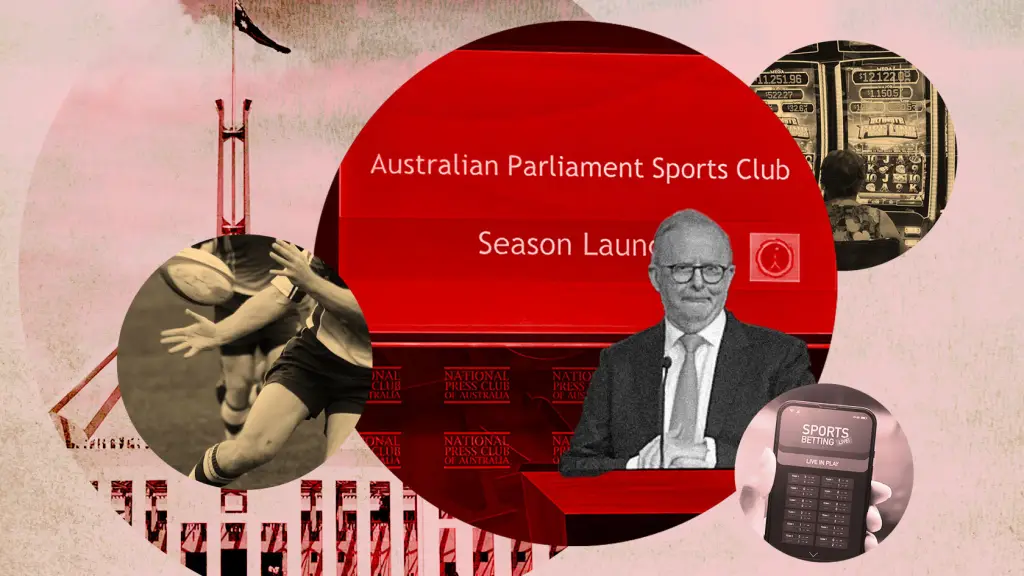
The Australian Parliament Sports Club (APSC) has been de-registered as a lobby group, marking a significant development in the ongoing scrutiny of its ties to the gambling industry. This decision comes shortly after independent Senator David Pocock was expelled from the club for questioning its connections to the gambling lobby during Senate estimates.
APSC’s CEO, Andy Turnbull, who also manages a sports event company, disclosed to Crikey that members of the club, including senators, had been informed 40 times about a betting industry lobby group being a “corporate member.” The group’s CEO had participated in soccer matches with the club on several occasions. The club, which promotes itself as a grassroots sports organization facilitating games among political staffers, politicians, lobbyists, and journalists, had recently been listed as a lobby group following criticism of its gambling industry sponsorship. Notably, Prime Minister Anthony Albanese serves as the club’s president.
Conflicting Advice on Lobby Registration
On Monday, Turnbull revealed to Crikey that he initially registered the APSC as a lobby group based on advice from a senior member of the Attorney-General’s Department. However, he later received conflicting guidance from the Australian Government Register of Lobbyists, suggesting that registration might not have been necessary. “Based on the advice provided above, I have this morning [October 13, 2025] de-registered,” Turnbull stated.
Turnbull’s company, Sports Hydrant, has been a registered lobbyist since September 8, 2009. He registered the APSC on September 22 of this year, and its de-registration means it was on the lobbyists’ register for less than a month. Turnbull emphasized that the betting industry lobby group Responsible Wagering Australia had been a member since July 2023, and he had informed members and senators about this relationship on numerous occasions.
Historical Context and Industry Influence
The APSC has received financial support from corporate members and sponsors for two decades without previous objections. Turnbull argued that the longstanding transparency indicated general satisfaction with the arrangements. However, Senator Pocock’s inquiries into the club’s sponsorship by the gambling lobby during Senate estimates raised concerns about “due process,” leading Turnbull to describe Pocock’s position as “untenable.”
Turnbull claimed he was initially entrusted with managing the club’s activities by politicians 15-20 years ago. However, a political insider from that era, speaking anonymously, questioned Turnbull’s involvement, suggesting it was more about socializing with politicians than formal arrangements.
“Nothing in Canberra happens without a reason. It’s an expensive city to go to,” the insider remarked, challenging the idea that no lobbying occurred during club activities.
Political Repercussions and Reactions
Senator Pocock described the current lobbying laws as “broken,” likening the sports club to a “cash-for-access scheme.” After Pocock raised concerns about the club’s lobbying status on October 10, Turnbull expelled him, sparking widespread political debate. The move prompted resignations from several independent MPs, including Monique Ryan, Sophie Scamps, and Allegra Spender.
Prime Minister Anthony Albanese initially downplayed the issue, characterizing it as “David Pocock being David Pocock, getting himself in a story.” However, following political backlash, Albanese suggested Pocock be invited back to the club, emphasizing that “participation should be open to everyone.” Despite this gesture, Pocock declined the offer.
Implications and Future Outlook
The de-registration of the APSC as a lobby group raises broader questions about the influence of corporate sponsorships in political settings. The controversy highlights the need for clearer guidelines and transparency in lobbying practices. As the political landscape continues to evolve, the scrutiny of such relationships is likely to intensify, prompting potential reforms in lobbying regulations.
Moving forward, the APSC’s role and influence in Canberra’s political and social circles will be closely monitored. The incident underscores the delicate balance between fostering informal political networks and maintaining ethical standards in governance.





